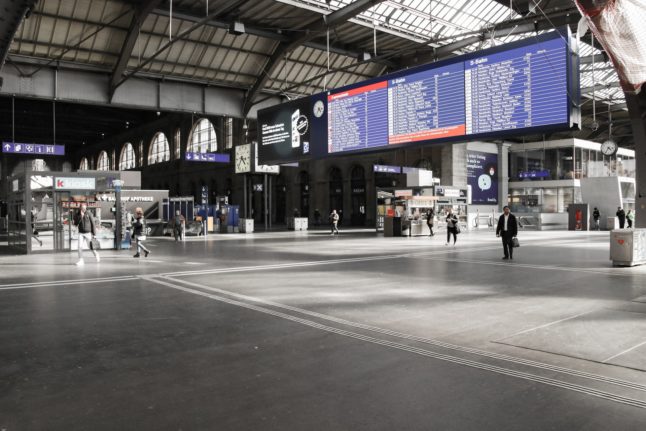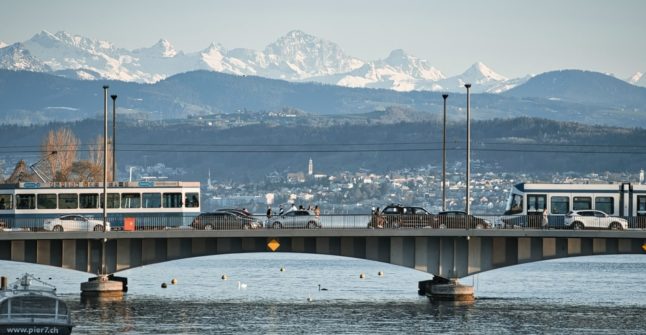More train connections
Zurich is to see more train connections and services from next month as part of a timetable change.
Swiss Federal Railways (SBB) announced this week plans to expand services with a particular focus on commuters as well as regions popular with tourists.
New direct connections from Eastern Switzerland and Zurich to Interlaken are planned, while an additional night train from Zurich to Prague, via Leipzig and Dresden in Germany will be launched.
The rail service said the number of seats available on the night trains to Hamburg, Berlin, Vienna and Graz will also be gradually increased.
SBB said that demand in commuter traffic has “recovered significantly” since the beginning of the year as the Covid pandemic has eased.
The operator therefore plans more trains between Zurich and Berne, and Zurich and Lucerne in the morning and evening.
SBB also plans to gradually reverse the cancellations of some trains between Zurich and Arth-Goldau from the timetable change until June 11th 2023.
Meanwhile, more direct trains will run between Zurich and Stuttgart.
On the Zurich S-Bahn, extra early morning trains will be introduced in the Limmattal (S12), Oberland (S14 and S15), Pfannenstiel (S16), Furttal (S6) and Bülach (S9) routes. Additional S11 connections will run between Zurich HB and Winterthur in the evening off-peak hours. And the S8 will run once again continuously to Winterthur in the evenings, so there will be no need to change trains in Effretikon.
The new timetable comes into force from December 11th.
Climate activists in Zurich may have to pay up
Climate activists have been staging road blockades in Zurich in recent weeks. And according to the government council, the Zurich cantonal police want to charge the protesters for deployment costs.
The cantonal police will claim compensation from those who caused the roadblocks, the government council wrote in an answer to a question in the cantonal council, reported Blick this week.
Cantonal councillors from the EVP, SVP and Mitte parties asked in a question how climate activists are being dealt with.
“Participation in unauthorised demonstrations that deliberately block traffic is a punishable offence,” the answer states.
According to the government council, the blockades also entail the risk that emergency services, for example in medical emergencies, may not reach patients in time.
In the past weeks, climate activists from Renovate Switzerland have blocked three roads in the canton of Zurich. The actions took place on Hardbrücke, Bellerivestrasse and the A3 motorway at the Sihlhölzli exit. Similar actions have also taken place in various other Swiss cities.
How high the deployment costs are and how exactly any fines would be implemented remains unclear, according to Blick who asked authorities for clarification.
READ ALSO: Who are Renovate Switzerland protesters and what do they want?
Essential apps to make life in Zurich easier for international residents
Whether you’ve just arrived in Zurich or you’ve been here a while but want to know the city better, these 10 apps will help make your life easier.
Central Zurich to see fewer cars
Streets around Zurich’s main railway station (Hauptbahnhof) are to become almost car-free in future.
In stages – and by 2050 – the number of cars around the station will be massively reduced, according to a final report by the city’s civil engineering office.
The city wants to create a space that meets the needs of future generations, according to the Tages-Anzeiger.
The planning teams chosen by the city, Vulkan and Van de Wetering, say they want to essentially get rid of road traffic at the Bahnhofplatz, the area between the main railway station and the National Museum, the Bahnhofquai and the Bahnhofbrücke.
A ring system is planned for bicycles, while two underground bike stations with direct access to the station are planned at Bahnhofquai.
These proposals will be included in the master plan that the city plans to present in 2023. Implementation for car-free zones is planned in stages
Shoppers flock to Zurich for Switzerland’s first Lego store
Switzerland got its first Lego store this week – at the Glattzentrum shopping centre in Zurich.
Lego fans travelled from all over the Alpine nation – and even from neighbouring countries – to be the first customers at the shop.
Some people queued from around 5am to get into the store, which opened on Thursday at 9am, reported Swiss news site 20 Minuten.



 Please whitelist us to continue reading.
Please whitelist us to continue reading.
Member comments